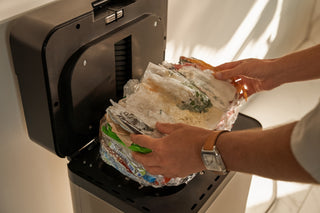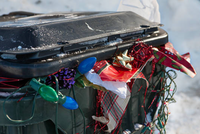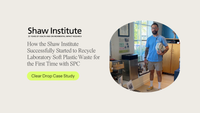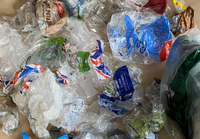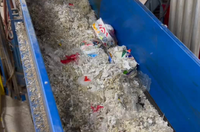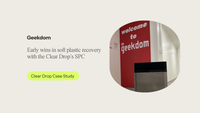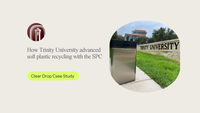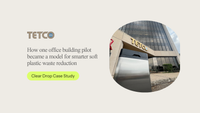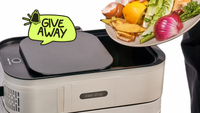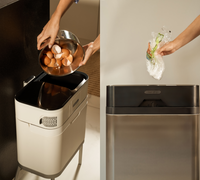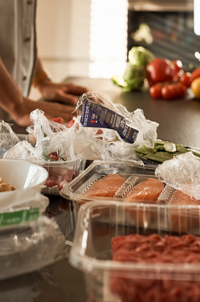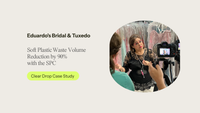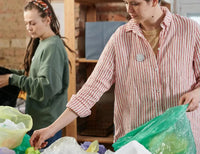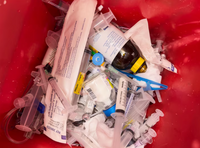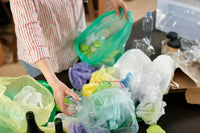Corporate sustainability is now a critical business priority. Both employees and customers expect companies to take action on waste reduction and environmental responsibility. While many focus on carbon reduction, improving business recycling – especially handling soft plastics that are not recyclable curbside – is essential for achieving measurable sustainability results and supporting long-term ESG goals.
Corporate sustainability has become a major component of any company’s ESG (environmental, social, and governance) program and has become a fundamental aspect of their overall business strategy. Corporate sustainability influences the hiring process, partnership deals, and company image.
Business recycling has emerged as a crucial element, helping companies reduce waste, minimize their environmental impact, and align with ESG principles. This is not only true for large corporations with formal corporate sustainability programs, but also for small to medium size companies looking to minimize their environmental footprint and align more closely with customer and employee expectations.
How sustainability strengthens employer brand and customer loyalty
Business sustainability practices are an essential part of corporate culture and necessary to attract top talent. A recent study by PwC revealed that "68% of job candidates say that environmental practices are important in choosing an employer". Employees want their companies to invest in sustainability efforts, including reducing carbon, using renewable energy, and reducing waste with soft plastic recycling technology.
Moreover, a Deloitte study found that most employees believe their companies should contribute more to addressing climate change and sustainability. Two-thirds of employees globally report that they do not think their employers are doing enough to address climate change and don’t have enough business sustainability practices.
In addition, more and more consumers expect companies to be more active in sustainability efforts. Forbes reports that "87% of consumers have a more positive image of a company that supports social or environmental issues". Consumer behavior also shows a trend in sustainable purchases and willingness to pay more for sustainable products.
According to Nielsen, "55% of consumers are willing to pay more for products and services provided by companies that are committed to a positive social and environmental impact". And about half of respondents (47%) in a Deloitte survey, Sustainable Consumption Trends, said they had purchased a sustainable good in the last four weeks.
Business recycling as a core pillar of ESG responsibility
As companies strive to meet ESG goals and reduce their environmental footprint, business recycling and waste stream management programs, including how they handle business soft plastic waste, are becoming essential. According to EPA data, 75% of the American waste stream is recyclable, but only about 30% of it is recycled. While businesses produce about 25% of all the world’s waste every year, business recycling rates tend to be lower than residential.
The challenge of rising plastic and soft plastic waste
More than 95% of plastics generated are put in a landfill or incinerated for energy. The EPA also revealed that while plastic recycling is on the decline, the per capita generation of plastic waste increased by 263% since 1980.
And what about soft plastic – or film plastic? McKinsey reports recycling rates well below 10 percent, although plastic film recycling is not widely tracked and reported. Soft plastic tends to reduce the efficiency of recycling other types of plastic, since it disrupts the sorting process when it is co-mingled with plastic bottles and other semi-rigid plastics. Soft plastics in particular disrupt sorting operations and require a separate solution like a compacting device that prepares them for proper recycling.
Business recycling programs
Businesses across various industries have implemented waste management programs that not only mitigate waste generation but also promote recycling, reusing materials, and fostering circular economy principles.
- Corporate: many companies, such as Apple, have set ambitious landfill diversion goals. Apple has committed to becoming carbon neutral for corporate operations and aspires to divert over 74% of its waste from landfills through their business recycling and reuse programs.
- Healthcare: University of Michigan (U-M) Health has completed a plastics recycling program at Mott Children’s hospital and the Von Voigtlander Women’s hospital. Operating room plastic was collected over a 6-month period and U-M was able to divert 2.64 tons of plastic from landfills. The program is now permanent and will be expanding.
- Higher Education: Virginia Tech, University of Richmond and Arizona State University are three examples of the many colleges focused on collecting and recycling soft plastic waste. Examples of film and soft plastics collected: air pillows, bread bags, bubble wrap, produce bags and shrink wrap.
How to set up waste recycling programs for your business
Setting up a comprehensive recycling program involves several key steps:
1. Conduct a waste audit: Check the types and quantities of waste that your company produces. This will provide a better understanding of these waste streams and the resources needed to better address them.
2. Separate recyclables: collect each type of waste separately including plastics, organics, glass, metal, cardboard and paper, and electronics.

3. Educate employees: Employee engagement is crucial. Create recycling educational programs to raise awareness and communicate how they can and should recycle at their workplace. Create easy access to recycling bins as well as simple instructions on what is recyclable and where it should be placed.
4. Set clear goals: Set specific goals for waste recycling, such as diverting 50% of your waste from landfills. Track your progress and share with your team regularly to ensure you’re moving forward with your targets.
5. Collaborate with certified recycling facilities: Negotiate with local recycling centers that are certified to process specific types of waste. Ensure that they are capable of recycling the materials you are collecting.
6. Invest in technology: For some companies, the complexities of recycling in the workplace may limit employee participation. Leverage online and app-based training tools to educate employees. Further, emerging innovative technologies are also enabling a shift towards a more convenient and circular approach in recycling programs.
How to improve soft plastic recycling in the workplace
Soft plastics such as film wrap, delivery packaging, and snack bags make up a significant portion of office waste, yet they are not recyclable curbside. To improve recovery rates in a business environment:
- Collect soft plastics separately from other recyclables.
- Keep them clean and dry.
- Compact them to reduce bulk and avoid landfill overflow.
- Partner with recycling services capable of processing soft plastics.
This structured approach improves recycling efficiency and reduces the environmental footprint of business operations.
Smart solutions for efficient plastic waste management
A new, innovative solution is now available that can help bolster your business recycling program by making your soft plastic waste collection more efficient and preparing it to be recycled more easily. One highly effective approach is using the Clear Drop® Soft Plastic Compactor (SPC) to compress bags, films, and packaging into dense bricks. This prevents contamination, reduces storage needs, and prepares materials for recycling rather than landfill disposal. The SPC transforms fluffy plastic packaging into a space-saving 12×8×4-inch block. The plastic brick is then processed at a dedicated recycling facility, using environmentally safe methods to give your plastics a second life and ensure the efficiency of your recycling programs.

As businesses continue to implement sustainable practices like comprehensive recycling and waste management programs, the focus on diverting plastic and other waste from landfills becomes increasingly important. Through innovative technologies, employee engagement, and organized programs, companies can reduce waste, meet landfill diversion goals, and enhance their corporate sustainability efforts.
Empower Your Business Recycling Program
Make soft plastic waste easier to collect, store, and recycle. The Clear Drop® Soft Plastic Compactor (SPC) transforms bulky packaging into compact 12×8×4-inch blocks ready for recycling.
Learn more: Clear Drop® Soft Plastic Compactor (SPC)
Savvy companies are recycling more; because customers expect it and employees want to be part of it.
Frequently Asked Questions
Why is soft plastic challenging for business recycling programs?
It cannot be recycled curbside and causes jams in sorting equipment, which reduces overall recycling efficiency.
Can businesses recycle soft plastics separately?
Yes, companies can collect soft plastics separately and use compacting solutions to make storage and transportation more efficient.
How does a soft plastic compactor support sustainability goals?
It reduces waste volume, prevents contamination, and helps companies increase landfill diversion rates while improving ESG performance.
What can recycled soft plastics become?
They are used to create long-lasting products such as pallets, decking materials, durable packaging, and outdoor furniture.


